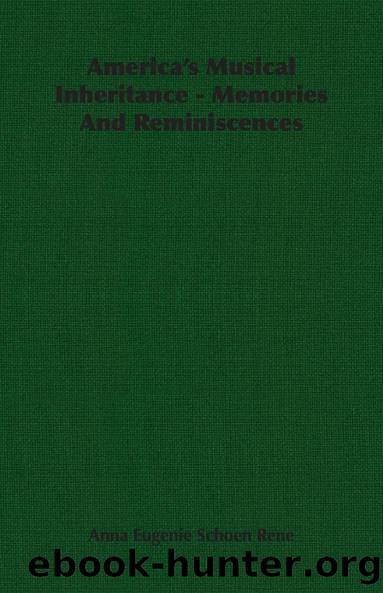America's Musical Inheritance - Memories And Reminiscences by Anna Eugenie Schoen Rene

Author:Anna Eugenie Schoen Rene [Rene, Anna Eugenie Schoen]
Language: eng
Format: epub
Tags: History, General
ISBN: 9781528760652
Google: jXonEAAAQBAJ
Publisher: Read Books Ltd
Published: 2021-03-22T01:03:48+00:00
1 âIf my father had not been severe with me, I should not have done anything well. I was indolent and stubbornâa little gypsy.â
Chapter X
PAULINE VIARDOT-GARCIA
MY PERSONAL feelings of devotion to Pauline Viardot-Garcia are so deep, that I feel my readers might think that in writing about her I would tend to idealize her, or exaggerate her greatness. I have, therefore, based this chapter, in which I deal with her early life (that part of her history with which I am not connected, since most of it took place before I was born) on the writings of musical authorities who lived and wrote during Viardotâs prime.
With the exception of a series of letters exchanged between Pauline Viardot and Julius Rietz, reprinted in The Musical Quarterly (Schirmer & Co., 1915-1916), and the history of Viardotâs influence on the Russian novelist Turgeniev which is fully treated in Avraham Yarmolinskyâs book, Turgeniev: The Manâhis Artâand his Age (The Century Co., 1926), little has been published in America about the life and influence of Pauline Viardot. She is not well-known here, because she never appeared in America as a singer. However, many of her pupils achieved great success here; and since I have labored for nearly half my life to pass on to American singers the artistic tradition of the Garcia family, I think it is time America learned something of the history connected with this tradition. This has been my main object in writing the present book, dedicated to her memory.
Pauline Garcia (1821-1910)âthe last but by no means the least distinguished of Don Manuelâs childrenâwas born in Paris on July 18th, in the same year in which Napoleon died.
The child was baptized Michelle Ferdinande Pauline Popolo de Vicente (for the original surname was retained in this personal use). Her two godparents were Ferdinand Paer, composer, musical director, and adviser to Napoleon I, and Princess Pauline Prascovie Galitzin, a socially prominent Russian whose salon was the meeting-place of the most brilliant men and women of that time. The coincidence has been remarked on, that from her very baptism, art and society thus both adopted Pauline Garciaâthe first for her talents, the second for her qualities of mind and heart.
When Pauline was only four, she had already given such evidence of musical talent, that her father began to teach her vocal exercises and scales. Even before she was able to speak distinctly, she had begun imitating the airs and solfeggi, sung by her father and her already distinguished sister Marie (Malibran) whose debut took place when Marie was sixteen and Pauline only three.
Paulineâs rapid progress in all branches of musical study was nothing short of phenomenal. While the Garcia family were in Mexico, she attained such a degree of skill at the organ and piano, that her father used to boast that his little daughterâs early promise was as great as that of the most famous composers in their childhood.
In 1828, when the family returned to Europe, her formal musical education began. Because of her
Download
This site does not store any files on its server. We only index and link to content provided by other sites. Please contact the content providers to delete copyright contents if any and email us, we'll remove relevant links or contents immediately.
Kathy Andrews Collection by Kathy Andrews(11795)
The remains of the day by Kazuo Ishiguro(8949)
Spare by Prince Harry The Duke of Sussex(5165)
Paper Towns by Green John(5163)
The Body: A Guide for Occupants by Bill Bryson(5065)
Industrial Automation from Scratch: A hands-on guide to using sensors, actuators, PLCs, HMIs, and SCADA to automate industrial processes by Olushola Akande(5038)
Machine Learning at Scale with H2O by Gregory Keys | David Whiting(4280)
Be in a Treehouse by Pete Nelson(4017)
Never by Ken Follett(3917)
Harry Potter and the Goblet Of Fire by J.K. Rowling(3834)
Goodbye Paradise(3790)
The Remains of the Day by Kazuo Ishiguro(3377)
Into Thin Air by Jon Krakauer(3369)
Fairy Tale by Stephen King(3352)
The Cellar by Natasha Preston(3316)
The Genius of Japanese Carpentry by Azby Brown(3277)
120 Days of Sodom by Marquis de Sade(3245)
Reminders of Him: A Novel by Colleen Hoover(3062)
Drawing Shortcuts: Developing Quick Drawing Skills Using Today's Technology by Leggitt Jim(3057)
